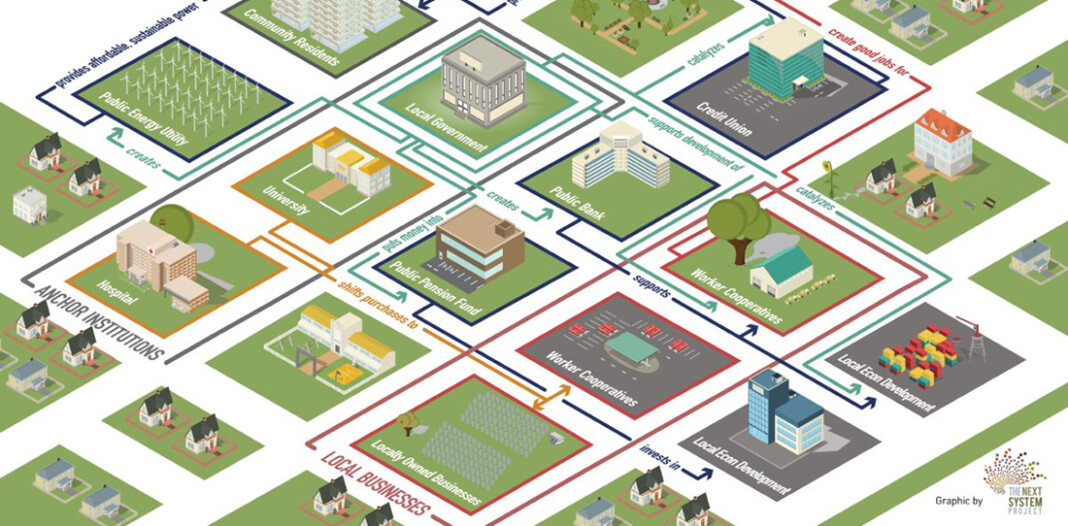
Community Wealth Building can play a key role in tackling poverty in Northern Ireland
By independent researcher Mary McManus
Destitution and poverty in Northern Ireland is predicted to soar. Now more than ever as well as helping people mitigate poverty, we need to take a solution-focused approach to preventing poverty. Community Wealth Building (CWB) is a common sense approach to local economic development that ensures the wealth in a place is kept circulating and working for the community rather than leaking away.
It came to prominence due to Preston’s significant outcomes from using the approach which has influenced numerous places including the Scottish and Welsh governments to adopt CWB. Here the Department for Communities has committed to the approach.
Local public anchor institutions such as councils and universities are key to CWB. The wages they pay and how they procure goods and services hugely impacts the local economy. The combined power of the CVSE sector can also be viewed as an anchor. NICVA’s State of the Sector data shows that in 2019-20 the sector had a combined spend/income of approximately £819 million and in 2018 employed 53,620 people, 7% of the total workforce.
In research conducted in 2021 with 30 independent advice centres, a CWB lens was applied to the combined power of the NI Independent Advice Network to look at how it functions as an anchor institution. It found that in 2019-20 these centres, representing just 45 per cent of the network, assisted the community to access £79.8 million in entitlement to Social Security. Social Security has an economic multiplier of 1.7 giving a total impact on the local economy of £135.6 million. This income increases economic resilience as it is spent with local businesses having a positive multiplier effect on local jobs, wellbeing, and health.

‘AS ANTI-POVERTY ORGANISATIONS, ADVICE CENTRES ARE SHOWING LEADERSHIP BY TARGETING POVERTY NOT JUST THROUGH THE SERVICES THEY PROVIDE, BUT ALSO THROUGH PAYING THE REAL LIVING WAGE … ‘
The research also found the majority of the centres pay at least the Real Living Wage and use their spend for public benefit by purchasing goods and services from local suppliers. Between just 15 of the centres, they provide on average NVQ Level 3 and 4 accredited training opportunities and work experience to 120 people per year.
The report recommends that advice centres should be an integral part of the NI anti-poverty strategy as a mechanism that drives local economic development and job creation. It should be funded on three-to-five-year cycles to give centres stability. It also recommends that all the members of the network, the CVSE sector and the public sector, accredit as real living wage employers to join the movement to reduce low pay levels in NI. And finally, it recommends that all these sectors undertake an analysis of their spend to ensure that they are using all their power to maximise their impact on the local economy to target poverty
As anti-poverty organisations, advice centres are showing leadership by targeting poverty not just through the services they provide, but also through paying the real living wage and purchasing goods and services from local businesses. The independent advice network is joining the departments for Communities and Finance, Development Trusts NI and their members, Trademark Belfast, Cooperative Alternatives, and the Northern Mutual Bank Campaign in the movement to advance CWB in this region. We need to have a wider conversation about what our economy is and who it is for. If life is not and has not been improving for people in persistent poverty in Northern Ireland, then it is time to try a different approach, such as CWB, to economic development.
You can read the full report here, It’s the Local Economy, Stupid! A ground up Community Wealth Building approach to target poverty: The Combined Power of the NI Independent Advice Network as an Anchor Institution
• Mary McManus has 24 years’ experience of working in the community in a Welfare Rights capacity. For over 15 of those years, she was Director of East Belfast Independent Advice Centre. Mary has spoken and written on issues of social justice and is a member of the grassroots campaign group, Right to Work/Right to Welfare which campaigns for social security reform and fair employment. In 2020, Mary completed Masters’ research at QUB into the anti-poverty potential of Community Wealth Building. She is currently an independent researcher and advocate for more systemic solutions to create a society that is fairer to both people and planet. She also works on practical ways to make them a reality.


 Happy New 2024!
Happy New 2024!  Upcoming FREE Co-operative Training 2024 - January
Upcoming FREE Co-operative Training 2024 - January  Upcoming FREE Co-operative Training 2024 - February
Upcoming FREE Co-operative Training 2024 - February